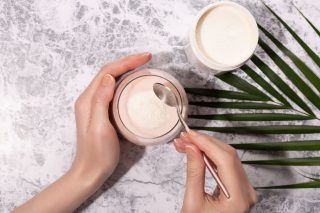
[ad_1]
With its benefits having been touted in headlines and social-media captions for several years now, it’s safe to say that collagen is a buzzword that will be around for some time.
But What Does Collagen Really Do For The Skin?

Photo by Teona Swift from Pexels
“Think of collagen as the frame of your mattress; it gives [your skin] structure and support,” says Joshua Zeichner, MD, director of cosmetic and clinical research in dermatology at Mount Sinai Hospital in New York.
But the older we get, the less collagen our body produces, and the more important it becomes to provide our body with the required nutrients. This is critical not only for healthy, elastic skin, but also for healthy bones, muscles, and cartilage. After the age of 25, collagen synthesis starts to reduce at a rate of 1.5% a year. By the time you’re 45, it may have fallen by as much as 30%.
“When your collagen levels start to deplete, the skin will gradually become more ‘saggy’ and less plump,” – Dr. Ewoma Ukeleghe, cosmetic doctor and founder of SKNDOCTOR.
In addition to reducing wrinkles, collagen can also help to improve the overall appearance of the skin. A study published in the Natural Medicine Journal found that women who took a collagen dietary supplement saw significant refinement in their pores, as well as an improvement in hyperpigmentation spots after six months.
It can also have a preventive effect, according to a February 2020 review in the journal Antioxidants. It found that taking hydrolyzed collagen can also protect against UV-induced melasma, a skin problem marked by patches of discoloration on the face, potentially due to its antioxidant effects.
Collagen in Skincare
While creams and serums containing collagen may help to moisturize the skin, any claims they make towards reducing wrinkles can’t be scientifically proven.
“Collagen is a huge molecule that sits on the surface of the skin and cannot be absorbed into the dermis,” board-certified New York dermatologist Dendy Engelman, MD, says. “When applied topically, it is not possible for collagen to penetrate, which is why we use other actives to stimulate collagen production.”
What Damages Collagen In The Body?
- Refined carbohydrates and sugar: These cross-link with collagen fibers and produce compounds, called advanced glycation end products (AGEs), that interfere with the production of collagen and prevent it from being able to repair itself.
- Excess exposure to the sun: When we spend too much time in the sun, overexposure to its UV rays can reduce the body’s production of collagen.
- Smoking: Smoking not only reduces the production of collagen in the body but can also result in wrinkles and prevent the healing of wounds over time.

lightwavemedia/shutterstock
On the flip side, when you increase your body’s collagen supplies, you can help to reduce wrinkles. A study published in the journal Skin Pharmacology and Physiology, involving a group of women taking either a collagen supplement or a placebo for eight weeks, noted that the women who had taken the supplement showed significantly higher elasticity and moisture levels in their skin than those who had taken the placebo.
But there’s more to it than adding scoopfuls to your green smoothie in the morning. You can boost collagen synthesis by increasing your intake of certain vitamins and minerals. According to a report by Medical News Today, these include:
- Vitamin C (found in citrus fruits, berries, blackcurrants, broccoli, and red and green peppers)
- Zinc (meat, dairy, shellfish, bread)
- Manganese (tea, nuts, green vegetables)
- Copper (nuts, organ meats, shellfish)
Make Your Own Bone Broth
You can prepare your own source of collagen in the form of bone broth, which has been shown to be very beneficial to the skin, digestive system, and bones. Bone broth can be added to soups, smoothies, sauces, and gravies. As the ingredients simmer, valuable nutrients, such as iron, vitamins A and K, fatty acids, selenium, manganese, and zinc, are released into the water in a form in which your body can absorb them.
Ingredients:
- 4 liters water
- 2 Tbsp apple cider vinegar
- 1-2kg animal bones
- Salt and pepper to taste
Directions:
- Place all ingredients in a large pot or slow cooker.
- Bring to a boil.
- Reduce to a simmer and cook for 12-24 hours. The longer it cooks, the better it will taste and the more nutritious it will be.
- Allow the broth to cool. Strain it into a large container and discard the solids.

Photo by Bluebird Provisions on Unsplash
The most nutritious broth is made from bones such as oxtail, knuckles, feet, and marrow bones. Try to mix and match different bones for optimum results. Also, apple cider vinegar helps to extract the nutrients from the bones into the water, which will become your bone broth. From there, you’re free to apply your own preference when it comes to spice and flavor.
Once your broth is ready, you can use it as the liquid for soups, sauces, or gravies.
The following is a recipe for a green minestrone soup that helps to heal the gut, fights inflammation, promotes weight loss, and provides valuable vitamins and minerals.
Ingredients:
- 2 tbsp olive oil
- 1 leek, chopped
- 2 stalks celery, chopped
- 1 clove garlic, minced
- 2 cups bone broth
- 2 cups water
- 1/4 cup stellini or pastina pasta
- 15oz canned cannellini beans, rinsed
- 1 bunch kale
- 8 spears asparagus, chopped or shaved
- Sea salt and pepper to taste
- Basil pesto to serve
Instructions:
- In a large pot over medium heat, warm the oil. Add the leek, celery, and garlic, and cook for 6 minutes, until soft.
- Add the bone broth and water. Turn the heat to high and bring it to a boil. Add pasta and boil for 4 minutes.
- Reduce heat. Add beans, kale, and asparagus, and cook until the kale is wilted and asparagus is tender – about 4 minutes. Season with salt and pepper.
- Serve the soup with as much or as little of the pesto as you like.
How To Choose A Collagen Supplement
 Today, there are many collagen supplements on the market from which to choose. However, there are also some that are best avoided. Do your research beforehand and don’t just opt for one based on its packaging or price tag. You’ll want a product that has the science and certification to back its claims. Here are some pointers for choosing a collagen supplement:
Today, there are many collagen supplements on the market from which to choose. However, there are also some that are best avoided. Do your research beforehand and don’t just opt for one based on its packaging or price tag. You’ll want a product that has the science and certification to back its claims. Here are some pointers for choosing a collagen supplement:
Make Sure That Your Seller Is Trustworthy
The easiest way to ensure that you get value for money is to buy your supplement from a trusted source, such as your dermatologist. Don’t just opt for an online offer if you aren’t sure about the origins.
Know the Different Types and Sources of Collagen
Collagen comes in many forms, but, according to Medical News Today, these are the most common types in the body:
- The connective tissues of the skin, bones, teeth, tendons, and ligaments is formed by Type I.
- Type II, which can be found in cartilage.
- Our organs, skin, muscles, and blood vessels get their strength and shape from Type III collagen.
- Type IV: This is a major component of the membranes that separate body tissues.
Cows produce bovine collagen (which benefits bones, joints, skin, and the gut), while marine collagen comes from fish (which benefits the skin). Porcine collagen, which is high in skin-friendly glycine, is derived from pigs.
Different collagen supplements will contain different amounts of Type I, II, or III collagen. You’ll want the supplement you choose to be high in Types I and III, because this is the main kind of collagen found in the skin.
Make Sure Collagen Is Listed as the First and Main Ingredient
Look for a supplement that lists collagen as the main ingredient (South African labeling laws require companies to list ingredients in order of weight). That way, you’ll be getting as much of what you’re paying for as possible.
Opt for Hydrolyzed Collagen
Collagen peptides (aka hydrolyzed collagen) have a smaller molecular size, which allows them to be better absorbed by the body. Hydrolysis makes the molecules small enough to pass through the intestinal wall and enter the bloodstream, stimulating your body to produce collagen.
Say No To Additives
If the supplement you’re looking at contains artificial sweeteners, colorants, or flavorings, it’s best to avoid it.
[ad_2]
Source link